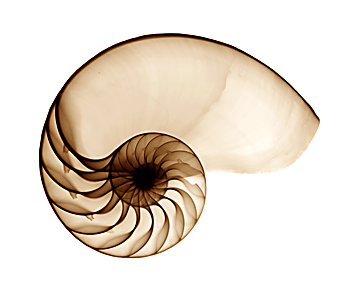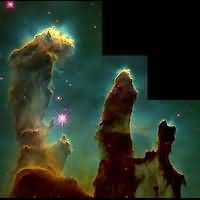Remote Ready Biology Learning Activities has 50 remote-ready activities, which work for either your classroom or remote teaching.
Serendip is an independent site partnering with faculty at multiple colleges and universities around the world. Happy exploring!

| 
| Exploring Emergence |
 |
 |
The deterministic/non-deterministic distinction enters in two places in the analysis:
1) Individual agents may or may not follow deterministic rules, but for me, unless proven otherwise, this is a distraction. While models wherein agents follow random rules will behave differently than deterministic models, it is not obvious that they will behave differently in any important way with respect to the set of issues that Emergence is attempting to investigate. The hallmark of complexity in its original chaos manifestation was that apparently unpredictable behavior could emerge from deterministic systems. I see no reason to deviate from that tradition now.
I say "apparently unpredictable" because in principle all of the behaviors in deterministic systems are completely predictable given enough computing power. As a practical matter, however, the behaviors may not be computable. Computer scientists have ways of measuring the amount of computing power necessary (such as how fast the computing requirements increase as the number of agents increase, etc.) which may, almost in principle, rule out the ability to predict. This is Prof. Jerry Gollub's view of complexity.
This "almost in principle" position can be expanded into an entire worldview of both the meaning of randomness and the meaning of free will (but not death, Paul). According to this worldview (which is mine), the outcome of a flip of a coin may be entirely deterministic, but it is "almost in principle" impossible to calculate all of the forces acting on the coin so as to predict the outcome. In the same way, what we see as human choice may in fact be a deterministic outcome of all of the forces acting on the individual, but it is "almost in principle" impossible for us to predict what the decision will be, so there appears to be free will. Moreover, as we look at our own choices and try to predict our own decisions, the same problem arises - what appears to us as our own ability to choose is really our inability to predict what choices we will make before we make them.
2) The second place where randomness enters the analysis is with respect to the possibility of randomly choosing the rules that the agents will follow. This, I think, is essential to many emergent systems, such as evolution, but I will get to that in the "creator questions"
2. How generally useful is the agents/environment/observer/creator distinction (3 in list above)? What are its limitations? Where does it break down? Where is it irrelevant?
These distinctions are very useful and important. If the agents are going to be simple, then many of the interesting behaviors will only come about if there is interaction with the environment. But, this is not absolutely necessary. So, in Schelling's segregation model, there is no interaction with the environment (in the sense of changing the environment) - the interaction between the agents is sufficient to generate interesting results.
Whether something is interesting or surprising is totally observer dependent. This is where Paul's penchant for relativism can be fruitful. It is silly to take the Idealist position that the agent does not exist if there is no observer. Most of the earth's history transpired at a time when there were no conscious entities (even loosely defined) to observe it. Still, we are as confident that the earth is older than consciousness as we are of anything. I am sure that there is some way that idealist philosophers can rescue Idealism from this criticism, but my response is that "you can dress it up, but you still can't take it anywhere". It is not silly, however, to hold that what constitutes an interesting behavior or outcome is entirely based on the observer.
3. How generally useful is the invariant/variant distinction (item 4 in list above)?
There probably is an isomorphism between the outcomes of models with:
Type 1 Agents: agents with fixed rules, but who die (there you go, Paul), and who are then replaced by agents who may have different rules, and
Type 2 Agents: agents with rules that can change.
Models with agents of either type can behave very, very differently than models with agents with invariant rules who live forever and are not replaced. There probably is an upper bound to how different things can get (or the diversity, or dispersion, of outcomes) in models with agents with invariant rules who live forever. Biodiversity only comes about because the natural world is populated by Type 1 agents.
4. One might imagine a classification scheme for at least some emergent systems based on items 1-3 above. Do there exist emergent systems of all sixteen possible kinds? Is their any interesting variation in any capability of emergent systems that correlates with membership in one or another of these categories?
I don't know what the 16 possible kinds are?
5. Is the recognition that bidirectional causal relations exist successively at the levels of agent/environment and world/observer more generally significant? Can it be usefully extended to creator/combination of world/observer?
It would be very useful to try to formalize mathematically what bi-directional means. For example, there are clear meanings to positive and negative feedback, and we know that positive feedback creates instability (or more diverse outcomes) and negative feedback creates stability. But, is bi-directionality positive or negative feedback or both, depending on the kind of bi-directionality? There are a lot of subtleties here that need to be investigated in many specific cases before we can draw any general conclusions about bi-directionality.
For example, in the Schelling segregation model, the following initially non-intuitive result emerges: if agents only dislike others, there is more spatial segregation than if they dislike others and like their own kind. The reason for this result is that if agents also like their own kind, then if a group of them begin to coalesce, this group can become a cohesive island in a sea of others (and there can be many such islands), but if agents only dislike others, they will all flee as far away from the others as possible. As I said above, this model has nothing to do with stigmergy, but you can see that the exact nature of the bi-directional interaction between the agents can matter a lot.
6. Would it make a qualitative difference if the bidirectional relationship affected not only agent behavior but also agent state?
Yes. If bi-directionality is of the positive feedback sort, then allowing agent states (rules) to change as a result of their interaction with the environment will accelerate change and increase the dispersion of outcomes. We know this because natural selection is an example of bi-directionality with respect to Type 1 agents, and in Question 3, I posited an isomorphism between Type 1 agents and the Type 2 agents here.
An agent with new rules is a qualitatively different agent - it is a genuinely new thing which cannot emerge if agent rules are fixed
7. Is the notion of some degree of "purposiveness" arising from bidirectional causal relationships more generally significant?
Purposefulness is even more in the eyes of the observer than is interestingness. Purposefulness requires not only the determination that the behavior is interesting according to some observer-dependent criterion, but also the determination that the agent being observed intended the outcome. If you accept my worldview on the meaning of free will, purposefulness becomes even more murky. While I don't think that we can do without the concept of interestingness, I wonder if we might be better off without purposefulness.
8. Is the notion of observer as adding "meaning" in a way that can vary more generally significant?
I'm at a loss here since it is the observer who creates the meaning. My argument against relativism is that the phenomenon exists independent of the observer (except for rare/weird cases like quantum physics), not that meaning exists independent of the observer.
9. Is there a way to replace "interesting" as a creator criterion with a "non-purposive" selection mechanism?
I thought that "interesting" was an observer criterion. If we are thinking of model building and the creator of the model as also the observer, then this creator/observer is going to try to create models with interesting outcomes, where interesting includes having real world explanatory power. So, the model builder is never going to randomly search across all classes of models. The model builder's search is going to be informed/constrained by preconceptions about what is possible and what may yield interesting results. Sometimes/usually this results in more effective searches, but sometimes these preconceptions may result in searches that are worse than random.
In the real world, we have a non-purposeful selection method called evolution. Whether it is random in the conventional sense or in my sense does not matter. But, if you have a random creator, then you absolutely need a non-random pruning mechanism (like natural selection) to choose what outcomes survive. It is amazing how well this combination works and how much diversity is generated by it over long periods of time. This amazingness is the flip-side of creationism: creationists can't get their heads around the fact that a random creator plus non-random pruning can lead to such complex outcomes.
This concept of random creator/non-random pruner is also what is behind the computer modeling done by the computer scientists in our group (which is why they are in our group). Rather than having a creator/programmer sit down and right down everything that is interesting, they let the robots generate the "hypotheses" and then use a non-random success criterion for choosing among the hypotheses.
10. Is there a way to create a world/observer relation that obviates the need for any continuing monitoring and adjustment by the creator?
Whether the creator is random or non-random, you can always shut him/her off, but then progress, or change, stops. If you leave the random creator turned on and shut the pruning mechanism off, you get random-drift. If you leave the pruning mechanism on and shut the random creator off, I'm not sure what you get.
Paul is probably trying to get at something with this question other than what I just said, but I will let him tell us.
One final Gender Studies Point: When I told my wife that I was preparing a presentation on Paul's 10 questions, her immediate response was, "do you know the answers to the questions?" When I told her that I hadn't even read the questions yet, she shook her head and said, "only a guy would do this".
| On-Line Forum for the World of Langton's Ant
| Complex Systems | Serendip Home |
| On-Line Forum for the Emergent Systems Working Group
| Emergent Systems Working Group | Center for Science in Society |